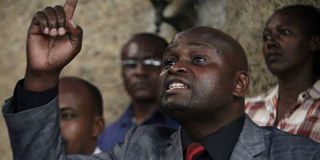Nurses to resume strike on February 1, says Seth Panyako

Kenya National Union of Nurses secretary-general Seth Panyako, who says they will resume their job boycott on February 1. PHOTO | FILE | NATION MEDIA GROUP
Nurses say they will go on strike again on February 1 because their payslips do not reflect the allowances their employers promised late last year.
The nurses boycotted work for three weeks in 2016, and after a series of meetings between their union officials, the Ministry of Health and the Council of Governors.
They called off the strike after the three parties agreed on December 16, 2016 that the health workers would be paid Sh15,000 in allowances for the lower cadres and Sh20,000 for others.
These amounts were to be paid in instalments in January and July this year.
THE CBA
Speaking to the Nation, Kenya National Union of Nurses secretary-general Seth Panyako said nurses would resume their strike because “the government has proven over and over again that it cannot keep its word”.
“Our faith is eroded. We make one step ahead and many others back,” an agitated Mr Panyako said.
Calling off the strike involved, among many other deals, the signing, registering and implementing of their collective bargaining agreement.
Like the doctors, the nurses want their allowances and other pledges honoured immediately.
Their threat to strike comes a few days after clinical officers made demands on the government and threatened to go on strike as well.
BULK STAFF
As of 2015, data from the Nursing Council of Kenya indicated that there were 73,562 nurses in Kenya, the bulk (46,038) being degree and higher diploma holders, also referred to as registered nurses.
Another 6,000 were in training in 2015 and were expected to join service in the near future.
Nurses form the largest portion of the healthcare workforce in Kenya, as in most countries.
They, and other mid-level healthcare workers, were the ones attending to patients as the effects of the doctors’ strike left a trail of suffering in Kenya’s public hospitals.
By Friday evening, the Council of Governors and the Health ministry had not responded to our inquiries.





